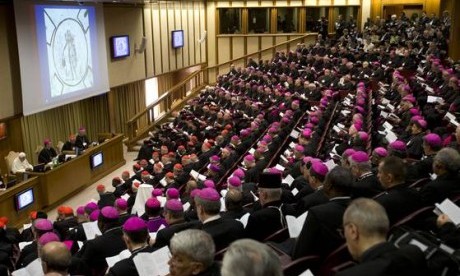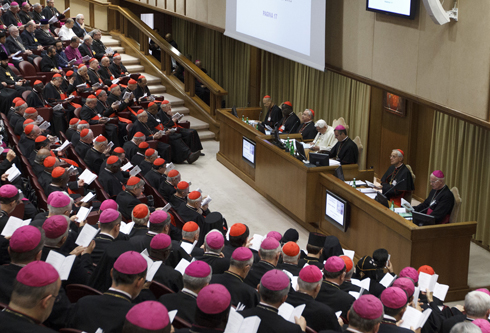|
Komunikat Nru 1 mis-Sinodu tal-Isqfijiet dwar l-Evanġelizzazzjoni Ġdida
biex innisslu l-Fidi Nisranija
Mibgħut lilna
mill-Eċċellenza Tiegħu
Monsinjur Mario Grech, Isqof ta' Għawdex.
15 Ottubru 2012

(1) Kumment dwar
il-Knisja fl-Ewropa
“The people of Europe, due to
the demographic decrease and the aging of the population and because
of the economic crisis and the weakening of cultural and religious
identity, is thirsty and hungry for hope.
The city mission organized in
many European centers has tried to emphasize this hope. "Who will
put happiness before our eyes?" (Psa 4:7) - was the motto of the
mission of Paris. "There is hope for your future after all" (Jer
31:17) - which was heard during the mission in Budapest. These
missions had lasting results: apart from contacting the non
believing society, this experience above all helped the parishes in
rediscovering their vocation to the mission towards the inactive,
but also towards non believers. Beginning last year, when we
reorganized a large mission in twelve European cities, we saw with
joy a spirit of initiative in many parishes. In answer to the family
crisis, it was even possible to make visits to all the Catholic
families in the name of the parish, entrusted by the Bishop.
Another sign of the times,
especially promising in Europe, is the growth of volunteers in the
parishes, especially for charitable works. The retired, in
particular, between the ages of 65 and 75, show a moving generosity
and contribute in reinforcing solidarity among generations”.

(2) Kumment dwar
il-Knisja Latino-Americana
“The pastoral renovation in
America, begun as a response to Vatican Council II, dynamized the
internal life of the Church: the pastoral agents have multiplied,
formation in the faith has intensified, participation and
Eucharistic communion by the faithful at Sunday Mass has grown;
thus, many and varied are the positive aspects of the pastoral
renewal of the Church ; without reservation I can state that growth
is not proportional to demographic growth of our peoples, and
because of this we can find large sectors of Catholics who are
distant and lukewarm in their Catholic identity, but undoubtedly
believers”.
(3) Kumment li
sar dwar il-Knisja fl-Asja
“Asia is a continent
experiencing the hopes and joys of a constant rebirth in the Spirit
(Ecclesia in Asia). We all know that 60% of the world's population
lives in Asia. It is a young continent with a majority of the
population young. And hence in several ways Asia is very central for
the future of the world. India and China which have 37% of the
world's population are emerging as major players on the
international scene in many fields.
Asia is a continent
experiencing the hopes and joys of a constant rebirth in the Spirit
(Ecclesia in Asia). We all know that 60% of the world's population
lives in Asia. It is a young continent with a majority of the
population young. And hence in several ways Asia is very central for
the future of the world. India and China which have 37% of the
world's population are emerging as major players on the
international scene in many fields”

(4) Kumment li sar dwar il-Knisja
fl-Oceania
The Bishops members of the
Episcopal Conference of the Pacific remarks: “We see everywhere the
vibrancy of youth, e.g. large numbers who attended World Youth Day
in Sydney in 2008; annual Téné celebrations in New Caledonia, the
youth festival in Samoa earlier this year; vocations to priesthood
and religious life with a missionary outreach. In these young people
we see a sincere and sometimes painful search for meaning and
spirituality as they bridge traditional cultural values and the
excitement of the technological age with the swipe of an I-pad or
smart-phone. It is sometimes difficult for them to resist the false
attractions of an aggressive media and entertainment industry.
In NEW ZEALAND we have
witnessed a new vitality of Catholic life through growing ethnic
diversity, as a result of the migration of peoples.
In AUSTRALIA there is a
strong engagement with society through adult education and new forms
of lay leadership in the church. Australia is the most advanced of
all the countries of the Federation with regard to media and
technology. They have shared this generously, e.g. in their support
of the Catholic Radio network in the Solomon Islands; and their
ready sharing of electronic resources for evangelization,
educational and pastoral formation. Over the past two years, the
diocese of Broken Bay has offered e-conferences that are streamed
live throughout the world. This new technology is a vital agent of
the New Evangelization.
 (5)
Kumment tal-Kard. Angelo Sodano (5)
Kumment tal-Kard. Angelo Sodano
In a recent speech to a group
of French bishops who had come to Rome for an “ad limina” visit, the
Pope said expressly: “Today the challenges of a broadly secularized
society serve as an invitation to seek a response with courage and
optimism by proposing the incorruptible newness of the Gospel with
boldness and creativity”
“With courage and optimism”:
this is also the hope I express on my own behalf and of all those
present, while recognizing the great difficulties that exist in the
present situation. Sometimes we too are tempted like the Apostles,
who said to Jesus on the Sea of Galilee, through Simon: “Master, we
worked hard all night long and caught nothing, but if you say so, I
will pay out the nets” (Lk 5:5). And this was followed by the
miraculous catch”
(6) Kumment ta’
Isqof mill-Peru
During my service as a
priest, I was always a pastor and I discovered that the favoured
place for teaching the faith is the Sunday celebration because we
believers listen to Jesus and celebrate the triumph of his cross, to
live the mandate of his Love. Every week we learn the words and
gestures of the Master to live in our family, our neighbourhood, our
places of work and study.
(7) Kumment ta’
Mons. José Horacio GÓMEZ, Archbishop of Los Angeles

Globalization is one of the
“signs” of our times. …. In a positive sense, globalization presents
us with a providential moment for advancing the Church's mission of
transforming humanity into one family of God. To evangelize in this
era of globalization calls us for a new proclamation of the mystery
of the Church as the universal family of God. The era of
globalization also calls us to draw from our rich traditions of
popular piety and spirituality in our work of evangelization.
Our traditions of popular
piety form a rich spiritual treasury that is part of the good news
that we can offer to lead men and women to participation in his Body
and Blood and to become partakers of the divine life.
We need to find the
“language” that best presents the traditional means of
sanctification - the sacraments, prayer, works of charity - in a way
that is attractive and accessible to people living in the reality of
a globalized, secular, urban society. With our rich treasury of
Catholic spiritualities - drawn from Gospel's inculturation in
“every nation under heaven,” and with our good news of God's “family
plan” for history, we possess powerful resources for our
evangelization of culture in the context of globalization and the
increasing secularization in our societies.
(8) Bishop Luis
Antonio G. TAGLE, Archbishop of Manila

A young girl asked: “Are we
the youth lost or has the Church lost us?”. Her question expresses a
longing for a Church where she can be found by Jesus and where she
can find Him. But for the Church to be the “space” of a
faith-encounter with the Lord, she must learn anew from Jesus in
whom we meet God.
The Church must learn
humility from Jesus. God's power and might appears in the
self-emptying of the Son, in the love that is crucified but truly
saves because it is emptied of self for the sake of others.
The Church is called to
follow Jesus' respect for every human person. He defended the
dignity of all people, in particular those neglected and despised by
the world. Loving His enemies, He affirmed their dignity.
The Church must discover the
power of silence. Confronted with the sorrows, doubts and
uncertainties of people she cannot pretend to give easy solutions.
In Jesus, silence becomes the way of attentive listening, compassion
and prayer. It is the way to truth”.
|